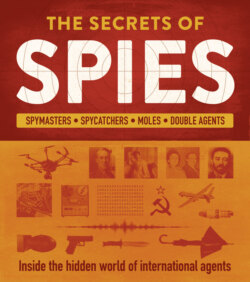Читать книгу The Secrets of Spies - Weldon Owen - Страница 26
На сайте Литреса книга снята с продажи.
ОглавлениеVENICE: CITY OF SECRETS
27
THE LION’S MOUTH
Venetian citizens were
encouraged to inform on those
they suspected of wrongdoing.
Stone letterboxes were
introduced throughout the city.
They originally took the form
of elaborately carved heads of
wild beasts or people with an
open mouth, and were called
bocche dei leoni (lion’s mouth).
The letters posted through the
mouth included accusations
ranging from adultery and
blasphemy to tax evasion and
treason. The denunciations
could not be anonymous,
however, and had to be signed
by at least two witnesses.
“SWEAR, FORSWEAR,
AND DO NOT REVEAL
THE SECRET.”
Oath taken by the Council of Ten
Above: Venice’s wealth and power were based around
its control of trade routes to the East, first opened up
by earlier explorers such as Marco Polo, pictured.
Below: Map of Venice from the fifteenth century,
when the city was the second-largest in Europe
and at the height of its power.
Above: This “lion’s mouth,” depicting
a wild-faced official, is located by the
Doge’s Palace in Venice.
FOREIGN AMBASSADORS
Venice introduced the system of resident ambassadors in the major cities of
Europe. The ambassadors represented Venice and its commercial interests to the
rulers of the host country, but they were also expected to send back intelligence
to the Council of Ten. Many ambassadors developed their own spy rings, using
foreign nationals to ferret out clandestine information.
By the early fifteenth century, Venice had become the foremost intelligence-
gathering nation in Europe. It relied heavily on the correspondence sent by its
merchants and ambassadors from around the world. To protect these letters from
prying eyes, the Venetians developed some of the most complex codes yet
formulated, and their codebreakers proved equally adept. Such was their skill that
the leading Venetian codebreaker, Giovanni Soro, was sometimes “loaned out” to
friendly foreign powers to help
break especially difficult codes.
Venice’s reputation as a center for
intelligence would last long after its
economic importance declined after
the opening of the Atlantic trade
routes shifted power to the west.
